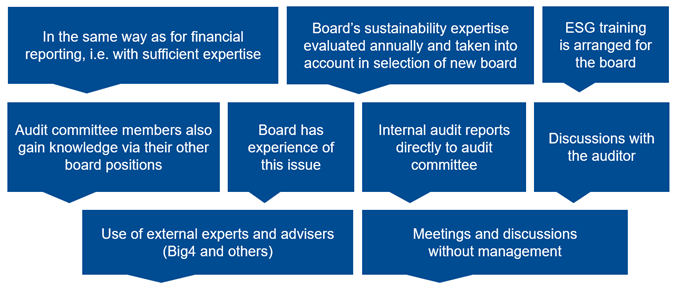12. Independence of audit committee from management ensured
The FIN-FSA asked audit committees to describe how the audit committee intends to ensure its independence from the company’s executive management in assessing sustainability reporting (question 7), for example whether it is anticipated that external experts will be used.
Figure 12. Examples of responses to question 7

A number of responses referred to the board’s independence from the company and significant shareholders. The responses emphasised that “the independence of the board of directors is regularly assessed in line with normal good governance practice”. Independence from executive management in sustainability reporting is ensured in the same way as independence in financial reporting. The means mentioned included familiarisation with the subject area to ensure sufficient expertise in the topic, reviewing significant decisions based on the judgment of management, and discussions with the assurance provider without the presence of executive management.
A number of respondents stated that they have discussions with the statutory auditor and slightly fewer with the internal auditor. One respondent stated that “the audit committee has a regular dialogue with the auditor” and another respondent that “the internal audit reports directly to the audit committee and is available to the audit committee”.
Based on the responses, training of the audit committee increases independence from executive management. It was stated, for example, that “training on the subject is arranged for the board of directors and members of committees” and “board members’ acting in positions of responsibility with other companies creates a validating environment for board members to assess the sustainability reporting of the company’s executive management”.
Around one third of the respondents said that they used external experts in their sustainability reporting implementation project throughout the project or at different stages of the project. Examples of the different stages included development of reporting and processes, determination of double materiality, gap analysis and calculation of carbon dioxide emissions. Around one third of the respondents said they were prepared to use external experts if necessary. It was stated, for example, that “the audit committee recognises the need to use a number of expertise providers to independently assess and assure the quality of sustainability reporting in the future”. One respondent stated that an “external consultant is considered to be used to review and challenge the materiality assessment on a regular basis”.
The board’s sustainability expertise is also evaluated annually in the board’s self-evaluation process, and ensuring sufficient expertise is taken into account in the selection of a new board. One audit committee stated: “Regarding the knowledge of the Board, the Board conducts a self-evaluation process annually, through which the performance and the work of the Board are evaluated for the purpose of continuously improving the Board’s work and efficiency. The annual suitability assessment of 2022 concluded that the Board members are individually and collectively deemed to possess adequate knowledge, skills, and experience, including knowledge of climate-related and environmental risks, to perform their duties, such as implementing sustainability reporting.”
According to the understanding obtained by the FIN-FSA, the audit committee’s independence from the company’s executive management is ensured through a sufficiently deep familiarisation with sustainability reporting and by using external experts. The expertise of the audit committee is therefore also important from the standpoint of enabling the audit committee to make its own reliable and independent decisions.